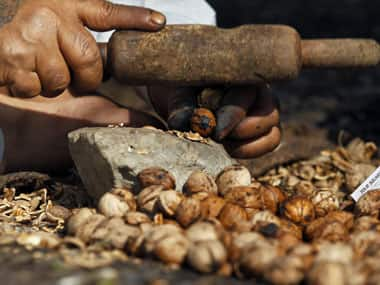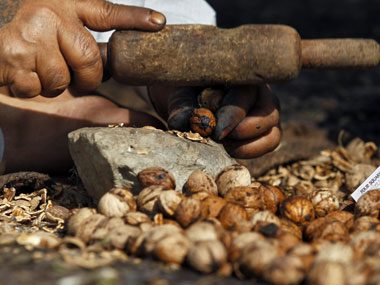There is nothing really sweet about this Diwali. Prices of all things associated with Diwali, especially sweets, have gone up and not surprisingly the demand has taken a hit.
The category of sweets that will pinch pockets this year will be dry fruits and dry fruit mithai. Prices of dry fruits have been the highest this year. Prices of walnuts have skyrocketed to Rs 1,600 with the best quality available at Rs 2,000. “Dry fruits are expensive compared to last year. Almonds are available at Rs 730 a kilo which cost Rs 600 last year, cashew nuts at Rs 640 against Rs 550 and pistachios at Rs 850 against Rs 650,” complains Virenbai, of Royal Foods and Namkeen, a wholesaler of dry fruits in Mumbai’s Crawford Market.
[caption id=“attachment_99062” align=“alignright” width=“380”]  Reuters[/caption]
Political uncertainty in Jammu & Kashmir just ahead of elections in the state has also added to the spike in prices.
“Almonds and walnuts are mainly procured from Kashmir and with the political uncertainty there, the availability is erratic and consequently, the prices have gone up,” informs Ashok Tewari, of Tewari Brothers, a 74-year-old company based in Kanpur with branches across India.
However, he is ‘pleasantly surprised’ by the demand for dry fruits mithai. “I can’t fathom what the reason is for it though,” he says.
Corporate gifting has not seen many takers for dry fruits this year on account of the high cost. Most organisations prefer to gift mithai instead of dry fruits, says Sudeep Mullick, director of the 129-year-old Balaram Mullick and Radharaman Mullick Sweets based in Kolkata.
The prices of sweets are usually lower in Kolkata compared with other parts of India as there are no taxes on sweetmeats. But even there, the takers for dry fruits mithai have come down.
“The daily sales at the store of 8-10 tons of sohan papadi, 2-2.5 tons of ladoos and 1 ton of barfis have not seen a corresponding increase in sales of sweets made of dry fruits,” says Jaikishen Baheti, MD, Haldiram Bhujiawala Ltd, Kolkata.
The demand for dry fruits and mithai made from it has fallen by 25 percent, says GR Singh at Punjabi Ghasitaram Halwai Karachiwala, Mumbai. American Dry Fruits store, Mumbai, too has witnessed a fall in demand in this category by 10 percent on the eve of Diwali.
Oil, sugar prices
Though there has been a marginal drop in prices of oil and sugar, the prices of mithai have not come down. Most sweetmeat makers say that the marginal decrease in the price of sugar and oil does not affect them as most of them prefer ghee to oil and the marginal drop in sugar prices does not make any difference to the prices of sweetmeats.
“We use refined sugar and for us this drop in prices doesn’t matter at all,” says Tewari of Tewari Brothers.
“We use ghee, besan, mava, etc. in sweets. Have their prices come down?” asks GR Singh of Punjabi Ghasitaram Halwai Karachiwala.
Another factor that is holding up the prices is the high labour cost.
“As long as the cost of labor does not come down, do not expect prices of sweets to drop,” asserts Singh.
Mithai as a category has gone through a lot of churn. A decade or more ago, mithais were seen as the only option of gifting during Diwali. It was also the affordability and the fact that it is easily available that made it very popular with the masses and the classes, as well. With food inflation spiralling upwards, the prices of mithai have also climbed up steeply. The cheapest sweet is available at about Rs 150 to Rs 200 a kg.
Most sweetmeat makers haven’t waited for the onset of Diwali to increase the prices. “We increased the prices of sweets by 7 percent after 3 years in August,” says Raghu Nagarajan, Partner, Sree Venkateshwara Sweets, Bangalore, established in 1954.
Nagarajan says that when two festivals come close to each other, then the buying capacity of the consumer gets affected. “The demand for sweets has gone up by 40 percent since May in India as that is the tourist season and people usually take away sweets as a distinct identity of a region or city they visit. We have seen demand go up by 40 percent since May. But since two festivals fall during the same period like Varahalakshmi and Ganesh Chaturthi in the South; and now Dussehra and Diwali-the demand for sweets receive a setback. Clients prefer to buy just token sweets for one of the festivals and splurge on the more popular one.”
Cashing in on the sky high prices are the unbranded players. So their jalebis and ladoos have made the way to newly sprung mithai shops as cheaper substitutes, mimicking the branded ones in taste, colour and size. One of the increasing dangers of this proliferation is food adulteration.
Delectable designs
The creativity of mithai makers have not been dampened by the rise in price of raw materials, though. They have let their hands do the talking, churning out delectable variants. At Mumbai’s Punjabi Ghasitaram Halwai Karachiwala, the most expensive mithai on offer is the cashew nut mithai at Rs 875 a kg. Tewari Brothers, Lucknow, has put out a special dry fruit mithai for Diwali called pista loj, costing Rs 5,100 a kg. “We have sold two to three units so far,” says Ashok Tewari on the eve of Diwali from Lucknow. Sudeep Mullick of Balaram Mullick and Radharaman Mullick Sweets, Kolkata, says he has three on offer-chanar panacotta, a type of eggless pudding priced at Rs 500 a kg, anando anaras, filled with chopped pineapples costing Rs 20 a piece and gondoraj sandesh made with a locally grown lemon and condensed milk sold at Rs 20 a piece.
Haldiram Bhujiawala has two costly sweet offerings: khajoor or date barfi at Rs 800 a kg and pista loj at Rs 2,800 a kg. At Venkateshwara Sweets in Bangalore, the almond barfi cost Rs 920 a kg. “We don’t offer any discounts, even if you buy it in bulk,” says Nagarajan when asked about the prices of sweets.


)
)
)
)
)
)
)
)
)



